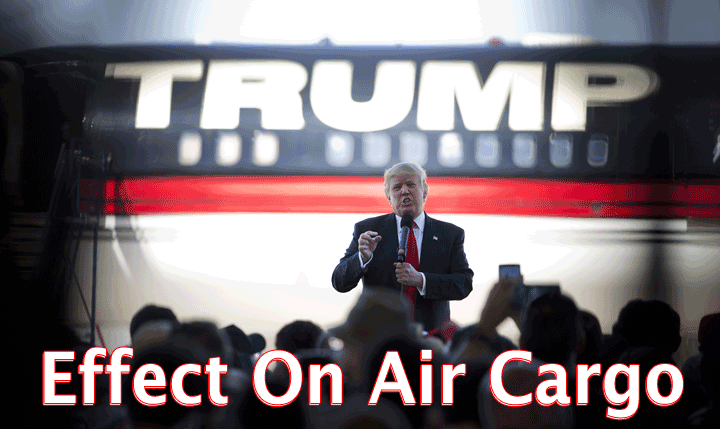
Will
President-elect Donald Trump’s new trade
policies affect air cargo if enacted? I believe
the answer is YES. But the real question is
whether the effect will be positive or negative.
With any major change, the outcome can be
mixed.
This article
is not intended to analyze world trade. I
leave that to the experts and the individual
carriers, but a few numbers are needed to
set the stage for my thinking. In 1950, the
U.S. represented over 20 percent of world
trade, with all the countries of Europe at
about 35 percent and the total Asian countries
at less than 15 percent. In 2014, the U.S.
dropped to under 14 percent, with the total
for Europe up a little, to about the 37 percent,
and Asia doubling to over 30 percent with
China replacing the U.S. as the number one
country in world trade. Now, we can argue
all day about which agency provides the most
actuated numbers, but what is most important
is the trend. Based on this trend, it appears
that President-elect Trump’s policies
are aimed at evening the flow and restoring
the U.S. to its former levels.
In my view,
the effect today on world air cargo is a tossup.
The one thing that appears likely is that
the TRUMP EFFECT, as I call it, will either
reduce the volume of world trade as the industries
are incentivized to produce more products
in the U.S. that are sold in the U.S., or
it will simulate efficiencies and lower costs
of production in the U.S. and make those products
more competitive in a global market. Personally,
I’m betting on both, which will restore
the U.S. percentage of world trade back to
the 20 percent level. Will there be strong
resistance from its trading partners, especially
Asia? Most certainly, but the question is
whether this new administration will stick
to their doctrine.
So will the
TRUMP EFFECT expand air cargo or reduce it?
If it hurts the U.S. trading partners’
economies to have more products sold in the
U.S. be produced in the U.S., it will surely
reduce air cargo at least in the short term.
If the U.S. corporate tax is reduced to 15
percent from about 45 percent and the U.S.
puts higher duties on imported manufactured
items, air cargo will drop. But if more people
in the U.S. become employed with good salaries
and therefore buy more products and the economy
doubles, as some people are predicting, while
U.S. manufactured goods benefit from “economy
of scale” and improved efficiencies,
that could make U.S. manufactured goods more
competitive globally, which will increase
air cargo. But, that will take longer to occur.
The TRUMP EFFECT,
if it does significantly improve the U.S.
economy, will benefit the large U.S. combination
carriers. However, short term it could hurt
the U.S. Charter Cargo Airlines, which will
reduce the U.S. non-integrator air cargo fleet.
These carriers will no doubt try to operate
more aircraft for the integrators by lowering
their prices and looking closely at ways to
operate in markets where short term air cargo
could increase, like between Europe and Asia.
This may lead to the new incoming administration
looking closely at its present open skies
policy and could easily cause them to focus
on the fairness of giving non-U.S. carriers
free access to most U.S. cities in return
for merely the same access in the non-U.S.
carrier’s country. So, will the TRUMP
EFFECT change the present view of open skies
and look at its fairness similarly to the
way they say they will look at renegotiating
many of the U.S. trade agreements? Will they
demand U.S. carriers get more out of the deal,
like 5th and 6th freedom rights in other parts
of the world in return for access to the many
U.S. markets? I know that many of you are
starting to shake your heads at this point,
but the second and third order effects of
policies this new administration has promised
deserve careful analysis.
Finally, what
will the TRUMP EFFECT have on CRAF (Civil
Reserve Air Fleet)? The U.S. government is
most likely the largest air cargo shipper
in the world and grants U.S. carriers access
to their business based on their commitment
to let the government have access to the carriers’
aircraft in various times of need. A vital
component of the CRAF program is the non-schedule
U.S. air cargo fleet. As stated above, the
legacy carriers should benefit from the TRUMP
EFFECT, but will the non-schedule air cargo
fleet? These carriers will face a server challenge
if the volume of trade (air cargo and integrator
business) to and from the U.S. goes down,
even short term. And this will have an effect
on CRAF.
In closing,
there is concern about consumer prices in
the U.S. skyrocketing and the effect on the
U.S. dollar, which will benefit countries
like China and Russia. But a valid argument
can be made that the U.S. economy will strengthen
because of more jobs, due to the lowering
of the corporate tax rate and its planned
effect on the expansion of manufacturing in
the U.S. This could put U.S. manufactured
goods on par with imported products. This
coupled with a strong government effort in
backing product development, quality improvements,
and innovation can prove to be a winning formula.
But if all this strengthens the U.S. economy
and the U.S. dollar increases in value, will
this make U.S. products too expensive globally?
There are many
more second and third order effects that can
be discussed, like the effect on Europe if
more of their budget must go to defense with
Present-elect Trump’s stance on NATO,
a possible continued reduction in oil prices
with fracking and coal more usable in the
U.S., the effect of renegotiated trade agreement
on countries’ economies, etc. These
can all influence air cargo volumes. But,
in the end, this incoming U.S. administration
appears committed to restoring a fair balance
of trade for the U.S., and those who predict
the outcome correctly will greatly benefit.
Bill Boesch
 Mr.
Boesch started his career in global
transportation and logistics in 1965
working for Seaboard World Airlines.
He later joined Flying Tiger Airlines
and Emery Worldwide. Mr. Boesch then
left Emery to become Pan American World
Airways’ Senior Vice President
where he headed both Passenger and Cargo
Sales and Operations. He left Pan Am
to lead American Airlines’ Cargo
operation and retired from AA in 1998.
Under his direction American became
a world leader in the air cargo and
logistics business. Mr.
Boesch started his career in global
transportation and logistics in 1965
working for Seaboard World Airlines.
He later joined Flying Tiger Airlines
and Emery Worldwide. Mr. Boesch then
left Emery to become Pan American World
Airways’ Senior Vice President
where he headed both Passenger and Cargo
Sales and Operations. He left Pan Am
to lead American Airlines’ Cargo
operation and retired from AA in 1998.
Under his direction American became
a world leader in the air cargo and
logistics business.
Mr. Boesch
was involved in projects for the U.S.
Government throughout his airline career
and became more active after retiring
from AA by serving as Director of U.S.
Aviation Policy for the White House
Commission on Aviation Security. He
also has worked for the U.S Government
in high level logistics and security
projects which included terrorist attack
planning and analysis. Mr. Boesch was
part of the extensive on site planning
and support of the Iraq drawdown, involvement
with the Afghanistan operations, and
has worked on all aspects of the Civil
Reserve Air Fleet (CRAF) from both an
airline and government standpoint.
Mr. Boesch
has also served as Chairman of the International
Air Transport Association (IATA) Cargo
Executive Subcommittee in 1996 and 1997,
Vice Chairman of IATA’s Cargo
Committee. Mr. Boesch served on the
Board of Directors of Air Cargo Incorporated,
Air Cargo International, The International
Air Cargo Association (TIACA), Envirotainer,
Cargo Logistics Solutions, Deutsche
Post/DHL Global Mail, al Seqir and consulted
for major US companies including Flight
Safety.
Mr.
Boesch is the recipient of numerous
awards including the Lifetime Air Cargo
Achievement Award, the Ellis Island
Medal of Honor and various awards from
the U.S. Department of Defense.
Mr. Boesch
is presently continuing his work for
the U.S. Government and heads up The
Council For Logistics Research.
|
|




 Vol.
16 No. 4
Vol.
16 No. 4 Vol.
16 No. 5
Vol.
16 No. 5